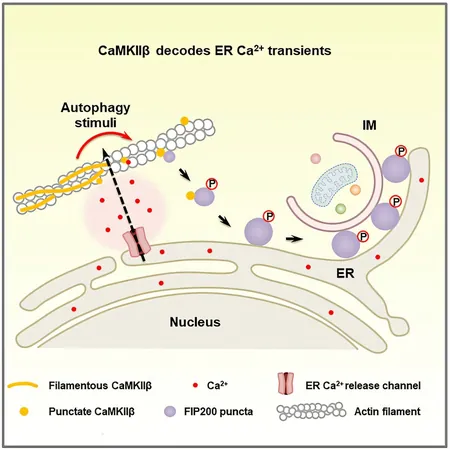
Unlocking the Secrets of Autophagy: CaMKIIβ Emerges as a Key Player in Cellular Rejuvenation!
2025-01-03
Author: Siti
Introduction
In a groundbreaking study published in *Molecular Cell*, researchers have unveiled the pivotal role of CaMKIIβ in transducing calcium (Ca²⁺) signals that initiate the formation of autophagosomes, critical structures for cellular cleanup and renewal. Led by Professor Zhong Hong at the Institute of Biophysics of the Chinese Academy of Sciences, this research sheds light on the intriguing interplay between calcium signaling and autophagy.
The Role of Autophagy
Autophagy is an essential cellular process that removes damaged organelles and proteins, playing a vital role in cell health and metabolism. The researchers have discovered that transient fluctuations of Ca²⁺ on the surface of the endoplasmic reticulum (ER) can induce liquid-liquid phase separation (LLPS) of the autophagy initiation complex known as FIP200. This process results in the formation of FIP200 puncta, which are critical for the subsequent generation of autophagosomes.
Findings of the Study
The team's findings revealed that when autophagy is prompted, these transient Ca²⁺ spikes cause CaMKIIβ to dissociate from actin filaments in the cell, leading to the formation of punctate condensates. This marked transition allows CaMKIIβ to play a central role in the assembly of FIP200 puncta. The study highlights a direct interaction between CaMKIIβ and FIP200, demonstrating that CaMKIIβ phosphorylates FIP200, thereby modifying its properties to ensure effective autophagosome formation.
CaMKIIβ's Dual Function
Furthermore, the research illuminated CaMKIIβ's dual function; it not only participates in the formation of these crucial cellular structures but also modulates the amplitude, duration, and propagation of Ca²⁺ transients during the activation of autophagy. These findings are monumental, especially as they suggest that the precise regulation of calcium signals is essential for proper autophagic responses.
Broader Implications
Intriguingly, the study hints at broader implications for health and disease. Mutations in CaMKIIβ tied to neurodevelopmental disorders, such as MRD54, disrupt normal autophagy processes. This disruption may contribute to the onset and progression of these diseases, pointing to a critical link between autophagy dysfunction and neurological conditions.
Conclusion
As scientists continue to unravel the complexities of cellular processes, this research stands as a beacon for potential therapeutic avenues. Understanding the role of CaMKIIβ not only enhances our knowledge of autophagy but could also open doors to novel interventions for diseases where autophagy plays a significant role. The research presents an exciting frontier, reinforcing the notion that maintaining cellular health is intricately tied to the regulation of calcium signaling and autophagy pathways.
 Brasil (PT)
Brasil (PT)
 Canada (EN)
Canada (EN)
 Chile (ES)
Chile (ES)
 Česko (CS)
Česko (CS)
 대한민국 (KO)
대한민국 (KO)
 España (ES)
España (ES)
 France (FR)
France (FR)
 Hong Kong (EN)
Hong Kong (EN)
 Italia (IT)
Italia (IT)
 日本 (JA)
日本 (JA)
 Magyarország (HU)
Magyarország (HU)
 Norge (NO)
Norge (NO)
 Polska (PL)
Polska (PL)
 Schweiz (DE)
Schweiz (DE)
 Singapore (EN)
Singapore (EN)
 Sverige (SV)
Sverige (SV)
 Suomi (FI)
Suomi (FI)
 Türkiye (TR)
Türkiye (TR)
 الإمارات العربية المتحدة (AR)
الإمارات العربية المتحدة (AR)